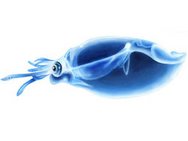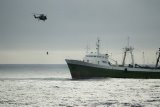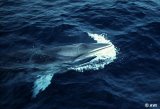
My Planet-अपने ग्रह-Ma Planète-私の惑星-Mi Planeta-我的星球-Planet μου-Il Mio Pianeta-Моя Планета-Meu Planeta-بلدي كوكب-mia Planedo-benim gezegen-Meine Planete
Friday, September 29, 2006
Boomerang effect for sharks

Tuesday, September 26, 2006
Sharks in the European Parliament

I am on my way to Strasbourg where I will join the team of the Shark Trust at the European Parliament this week.
The European Parliament's Fisheries Committee has adopted a report that recommends to weaken the EU regulation aimed at preventing shark finning (the removal of shark fins and the dumping at sea of the rest of the shark's body).
This week's Plenary Session of the European Parliament will either rubberstamp this irresponsible recommendation, or put a halt to the manoeuvres of a handful of parliamentarians who have chosen to act on behalf of the dodgy international shark fin trade (considered prime cause of shark mortality) rather than acting to conserve marine biodiversity.
The European Union already has one of the most lenient shark finning regulations. If the European Parliament caves in and adopts even weaker rules this week, there is a real risk that(as a member of most regional fisheries organizations in the world) the European Union seeks to turn their own weak standards into international ones.
A proposed 6.5% weight ratio of the shark fin to the rest of the body would allow three out of each shark landed to be finned (shark specialists say that only a 2% ratio is liable prevent the dumping of shark bodies at sea). Furthermore, the European Parliament is asked to allow that fins and bodies be landed in different ports, thus making any serious monitoring and control virtually impossible.
With shark specialists and NGOs now sounding the alarm, will the European Parliament amend the proposal, and make it compatible with the European Union's commitment to restrict its global environmental footprint?
Monday, September 25, 2006
Pillage des fonds sous-marins en haute mer: le point sur le moratoire

Excellente dépêche de l'AFP datée de vendredi dernier, faisant le point sur la proposition de moratoire sur le chalutage de fond en haute mer sur laquelle se prononcera l'Assemblée Générale des Nations-Unies dans les prochaines semaines. A y noter tout spécialement: les prises de position du Directeur-en-exercice de l'UICN et celle de Stravos Dimas, Commissaire Européen chargé de l'Environnement qui regrette que l'Union Européenne continue à traîner les pieds.
A propos de la position de l'Union Européenne, le 8 septembre dans ce blog, nous nous interrogions sur le fossé entre le discours et l'action du Gouvernement français sur ce dossier.
Depuis lors, au cours de deux réunions de concertation qui ont eu lieu à Bruxelles les 19 et 20 septembre visant à arrêter la position qu'adoptera l'Union Européenne aux Nations-Unies, la délégation française a enfin informé ses partenaires européens de son soutien à un moratoire sur le chalutage de fond en haute mer dans les zones non réglementées par des accords régionaux.
Les pourparlers européens continueront cette semaine, avec la réunion du Comité Pêche-Exterieure cette fois-ci.
Espérons que la France continue sur cette lancée.
Sunday, September 24, 2006
Deepsea bulldozers

I found this photo on the blog of a group of Canadians campaigning in support of a moratorium on high seas bottom trawling.
In front of a bulldozer, Wayne Eddy (a fisherman) holds in his hands a billboard that reads: What this does to the land, bottom dragging does to the Oceans.
Simple, and to the point. Images speak louder than words...
Speaking of words (and of Canada) I read last month the book Cod: A biography of the Fish that Changed the World. Highly recommended reading for anyone interested in the linkages between marine biodiversity conservation, and social and cultural welfare.
Those of you who can read French should also read (and circulate as appropriate) Agence France Presse's excellent feature story on the most recent political developments regarding the proposed moratorium on high seas bottom trawling (deepsea bulldozing) released last Friday.
Saturday, September 16, 2006
Giant floating vaccuum cleaners in Antarctica

My friend Clif Curtis has sent me an email to draw my attention on the op'ed he's got published in the International Herald Tribune this week-end.
Clif currently runs the Pew Charitable Trusts Krill Conservation Project set up recently to address threats from industrial harvesting of krill, the web of all life in Southern Seas marine ecosystems.
As Clif explains in his piece published in the IHT, there are now huge floating vacuum cleaners out there which are capable of sucking 120,000 metric tons of krill per season. Precautionary measures are urgently needed before species that rely on krill (whales, seals, penguins, etc) are starved or severely affected. A challenge for the Parties to the Convention for the Conservation of Antarctic Marine Living Resources who are meeting next month in Australia.
Salmon farming in Norway and elsewhere is one of the key markets for krill harvesting.
Krill means whale food in Norwegian.
Not salmon food.
Friday, September 15, 2006
Vulnerable sharks

The launch a couple of weeks ago of a new coalition of NGOs and scientific organizations to seek the conservation and sustainable management of sharks, the Shark Alliance, is good news.
Because of their bad reputation, few people (if you compare with the widespread concerns for dolphins, whales, sea turtles, seals or even deepsea species other than sharks) seem to care for the fact that sharks are going down the tube worldwide. When Kelly and I were asked a year ago by a large foundation concerned with marine biodiversity to interview specialists and to prepare a report to scope out options for a strategic approach to shark conservation, many laypersons unfamiliar with the challenges of biodiversity were telling us "You work on sharks! Why do you want to protect them?". One finding that struck me when we undertook this work last year was in a report that said that the number of people attacked (in unclear circumstances) by a shark in the Mediterranean since World War II was...two ! Compare this with the number of people who die every year, every day, when they drive to the Mediterranean coast; that helps putting things in perspective. Why do most people fear sharks, and continue to love cars?
Like all top predators, sharks (often described as the wolves of the sea) help us rethink the role of humankind in nature. Their plight can help people move from an homocentric to an ecocentric understanding of our world.
NGOs want to alert the European Parliament of an imminent attempt to weaken the current European legislation that was designed to prevent shark finning (the dumping of the whole shark body after fins have been removed to be exported to Hong Kong and end up in shark fin soups, a Chinese gourmet dish whose consumption is booming in the new China and elsewhere).
Rather than weakening, the EU legislation needs strengthening, if the European Union wants to take seriously its pledge to minimize its global environmental footprint. The European Union pledges to be an environmental leader, but it is a shark finning superpower. After so much talking about the need to reduce the impact of international trade on biodiversity, stopping shark finning would be a good opportunity for the European Union to put its words into action.
At their request, I will join the NGOs at the European Parliament in Strasbourg in the last week of September, when this issue will be discussed.
Friday, September 08, 2006
Beau discours -- A quand l'action?

Wednesday, September 06, 2006
Chez Rémi upgraded

What's new?
1.- The URL of the blog has been simplified: now you can access http://chezremi.com/ [when you are not on your own computer, no need to ask yourself "chezremi.dotwhatwasit?", it's very simple]
2.- The vast majority of the blogposts published since Chez Rémi opened in April 2005 have been indexed [in the "Labels" section in the right-hand margin, and future posts will be indexed on an on-going basis]
3.- There is also a new dropdown menu to access past Blogposts chronologically [see "Blog Archives" in the right-hand column]
4.- Also on the right-hand column Chez Rémi now feeds you directly with the BBC website's Science & Nature stories [Handy isn't it?]
Chez Rémi will continue to make improvements, and to provide you with news and analysis on environmental and other developments and trends.
Work with the Varda Group will be very intense in the next three months. Watch the Varda Group's website when you have a moment. It's so intense that if you need me or any of my Varda Group's colleagues, please make sure you book us well in advance.
Sunday, September 03, 2006
No me fumes

Nuestros amigos de nofumadores.org han creado una excelente herramienta de denuncia online para que cualquier ciudadan@ pueda exigir que se aplique la Ley Anti-Tabaco española.
Saturday, September 02, 2006
Histoire de famille

Diable !
Le frère de Ségolène Royal était l'un des agents de la DGSE qui placèrent deux mines magnétiques sur la coque du Rainbow Warrior dans le port d'Auckland le 10 juillet 1985.
J'ai découvert cette anecdote dans un article par ailleurs fort intéressant que m'a envoyé Laurence Mermet. J'ai demandé à Laurence si elle savait qui est le mystérieux auteur qui se cache derrière un obscure pseudo. Malheureusement elle n'a pas su me répondre.
Si vous avez une idée, faites-moi signe.
Friday, August 11, 2006
Click against the bombs

Click here to read about and join Res-publica's campaign in support of an immediate ceasefire in the Middle East.
I have the privilege to live in the city, Madrid, where the universal symbol of civilian populations victim of armed conflicts, Picasso's Guernica, is exhibited. But this summer, Guernica can easily be renamed Beirut.
Periodically in Spain, there is a fairly trivial (if you ask me) domestic political controversy over whether Guernica should be transported and exhibited in the Basque Country. Experts say that it is not feasible given the size and age of the masterpiece that has already gone through a lot of damage in many successive moves in the 1930s and 40s. I think, anyway, that if Picasso's Guernica should be transported anywhere, it should not be in the Basque country but in contemporary Guernicas. In Baghdad, in Beirut, in Sarajevo a few years ago, etc.
(If you have the opportunity, don't miss the display of Goya's Tres de Mayo almost side-by-side with Guernica at Madrid's Reina Sofia Art Centre; and Picasso's stunning duel with Velazquez and Goya at the Prado Museum. Both unrepeatable exhibitions marking the 25th anniversary of the "return" of Guernica to Spain will close on 10 September (Prado) and 25 September (Reina Sofia) respectively. Hurry up!)

Friday, August 04, 2006
International Fundraising Congress

At last year's Spanish National Fundraising Congress, immediately after I finished my keynote presentation "How to create and Reinforce Synergies between Fundraising and Advocacy Campaigns", Mal Warwick asked if I would do a similar presentation at the International Fundraising Congress that takes place each year in the Netherlands.
I told him that in principle I would welcome the opportunity. I am always glad to interact and exchange views with CEOs, Marketing and Fundraising Directors, and other managers and consultants from major philantropic and advocacy organizations worldwide.
The International Fundraising Congress takes place 17-20 October this year in Leeuwenhorst. There is apparently a good list of speakers with complementary skills and experiences.
I will make my presentation in workshop mode there on October 18 and 19, as part of the Beyond Fundraising cluster.
I look forward to this opportunity to share my views about Fundraising as a tool for advocacy. Fundraising is one of the four pillars of advocacy organizations, but it is too often poorly integrated with the other three pillars (governance, communication and intervention).
Someone told me that this annual gathering in Leeuwenhorst is the Davos of fundraising. Minus the riots (I hope).

Friday, July 28, 2006
Civil society pavilion at EXPO Zaragoza 2008

At the request of our friends from the Ecology and Development Foundation of Zaragoza (ECODES), I have joined the Steering Committee for the development of The Beacon, the civil society pavilion of EXPO Zaragoza 2008, the next world exhibition that will take place in Spain from 14 June to 14 September 2008, under the heading “Water for sustainable Development”.
ECODES is a leading NGO in the fields of sustainability and water, fair trade, and corporate social responsibility. It is for me and for the Varda Group a great opportunity to work with them on such an important issue. Without equitable access to safe water, there is no food, no health, no justice, no life.
ECODES was asked by EXPO 2008 to co-ordinate the development and management of a pavilion of citizens’ initiatives. They asked me to join the international ECODES Steering Committee formed to oversee and develop this project. The team also includes our friend Pedro Ralda of Logistica Justa (who pulled together key people with different complementary skills to join forces with ECODES), and we started work two or three months ago.
A bid for the construction of the pavilion will soon be made public, including strict environmental compliance criteria for the building, maintenance and dismantling phases.
Yesterday, we launched on behalf of ECODES an online consultation for NGOs and other civil society organizations. The goal is to secure the active participation of a good mix of local, national and international civil society organizations, including NGOs, foundations and think-tanks involved with water issues, humanitarian, environmental and development organizations, consumers and trade union organizations, etc. And to build an attractive, creative and moving programme for the 6 million visitors expected at EXPO 2008. If you belong to a Civil Society organization that works on water issues, you can reply en español, in English, et en Français, to register and flag (by 10 September 2006) your initial interests and ideas. If you know others who should be aware of this announcement, forward it to them.
Based on this initial consultation, the Steering Committee will start building and proposing an all-inclusive consistent draft programme of activities, in partnership with those wishing to participate.
With its international dimension, EXPO 2008 will be a unique outreach and advocacy opportunity.

Saturday, July 15, 2006
No excuse

When a moratorium on high seas bottom trawling was first proposed in 2004, the UN General Assembly postponed its decision for two years. They commissioned a detailed review of the issue and said that they would consider it in 2006.
The UN Division for Ocean Affairs and the Law of the Sea (DOALOS) has just released its report yesterday. And its finding vindicate the proposed moratorium on high seas bottom trawling.
Well, there is no excuse now.
The UN General Assembly will start discussing the proposed moratorium again in the first week of October.

Thursday, July 13, 2006
Vital tool

The Worldwatch Institute has just announced the release of its publication Vital Signs 2006-2007.
Like each year, Worldwatch analysts track critical trends that are shaping the future, and provide graphs and charts that give a visual comparison over time.
Food, Agricultural Resources, Energy and Climate, Global Economy, Resource Economics, Environment, War and Conflict, Communications and Transportation, Population and Society, and Health and Disease are covered in this year's edition.
There is also Vital Signs Online, which constitutes a handy resource for analysts and academics, opinion- and decision-makers, journalists and activists, etc.

Wednesday, July 12, 2006
Portuguese NGOs call for deepsea biodiversity conservation

The Portuguese newspaper "Publico" reports today that our friends from the three largest Portuguese NGOs are calling on the Portuguese Government to clarify their position on a major marine biodiversity conservation issue.
GEOTA, LPN and Quercus are asking their Goverment to come out in support of a moratorium on high seas bottom trawling at the UN General Assembly later this year. All three organisations are members of the Deep Sea Conservation Coalition.
There have been mixed signals coming from Portugal, on the proposed moratorium on high seas bottom trawling. At the end of May during a Workshop on high seas biodiversity conservation held in Lisbon, Portugal's Environment Secretary Humberto Rosa implied that high seas bottom trawling had no future. But a few days later, a Portuguese Fisheries official stated that Portugal could not support a high seas moratorium.
It is hard to tell whether the Fisheries official position was only the expression of his personal belief.
Meanwhile, a few days ago the Norwegian coastguards have announced that they have arrested an unflaged pirate trawler with Portuguese corporate ties, in the high sea area currently the subject of a jurisdictional dispute between Norway and the Russian Federation (photo).

Tuesday, July 11, 2006
Wednesday, July 05, 2006
Fundraising, otra vez

Recibí ayer un email de Asensio Rodríguez, el Director de Fundraising y Comunicación de Greenpeace-España que me dice que ha visto en este Blog que yo dí el mes pasado mi presentación sobre "Como reforzar sinergías entre Campañas y Fundraising" en un seminario organizado por la Asociación de Profesionales del Fundraising de España.
El email de Asensio me recuerda ahora que yo no informé en este Blog que mañana jueves 6 de julio repetiremos, porque el gran número de inscritos el mes pasado no cabia en la sala.
También los organizadores del Congreso Internacional de Fundraising (Octubre, en Holanda) me han contactado esta semana para que yo haga la misma presentación allí. Tengo que averiguar si es compatible con mis otros compromisos ese mes.

Sunday, June 25, 2006
Whale hang over

Richard Black from the BBC did a superb job last week, reporting from the annual meeting of the International Whaling Commission (IWC) in StKitts.
Read his two wrap up stories ("Can the Whales be saved - again?" which describes the thoughts and mood on the environmental and animal welfare NGO side, and "Compromise talk after whaling win" which shows that something serious has got to be done to fix the whaling issue.
The right-hand columns on these pages are also useful resources, with links to other BBC stories from StKitts and to other relevant websites.
A special mention should go to the daily video-webcasts on the Whalewatch site, which I had not seen until today (well done, Leah).

Monday, June 19, 2006
Harpooning a dinosaur

Immediately after the adoption of a so-called St Kitts Declaration at the annual meeting of the International Whaling Commission (IWC) this afternoon, the main spokesman of the Japanese delegation said it was "a historic day."
In the two operative paragraphs of the resolution, the thirty-three countries that voted in favour:
* [...] express[...] concern that the IWC has failed to meet its obligations under the terms of the International Convention for the Regulation of Whaling (ICRW), and
* Declar[e][...] commitment to normalizing the functions of the IWC based on the terms of the ICRW and other relevant international law, respect for cultural diversity and traditions of coastal peoples and the fundamental principles of sustainable use of resources, and the need for science-based policy and rulemaking that are accepted as the world standard for the management of marine resources.
Commentators in the press and elsewhere are saying that the end of the moratorium on commercial whaling is now one step closer.
But this may or may not be true:
First, the adoption of this resolution by 33 Yeses, 32 Nos and 1 abstention does not resolve the traditional divide within the IWC. It is even likely to deepen it (and, remember, to eliminate the moratorium the pro-whalers would need a three-quarters majority in accordance with the rules of the International Convention for the Regulation of Whaling). [Several countries are also on record questioning the legality of the vote for various procedural issues.]
Second, and more importantly, it is possible that this resolution could have a boomerang effect against the pro-whaling interests. It could trigger a wake up call for opinion- and policy-makers (and for the wider public as a result.) [For how long had the IWC not made the front page of the world press?]
The amazingly aggresive language in the resolution, and the unusually undiplomatic words used on the floor by delegations that sponsored the Draft Declaration will maybe ring the alarm bells in the capitals of the countries that have traditionally opposed commercial whaling in the last thirty years.
It could also change the political landscape in many of the countries who are supporting the resumption of commercial whaling. According to public opinion polls commissioned by the WWF in pro-whaling countries, the public opinion in these countries does not support the position of their respective governments on this issue. Now that these governments have helped effectively Japan to win its first victory in 24 years (now that the threat of a resumption of commercial whaling is less hypothetical), it is likely that there will be more public scrutiny in these countries. People will look more closely at what is behind the interest in whaling of the elites of these countries. We hear them say that they have been convinced by Japan that whales are going to eat all the fish. But according to Transparency International, the NGO that fights corruption and bribery, there may be other reasons.
The preambular language of the resolution also:
* Accept[s] that scientific research has shown that whales consume huge quantities of fish making the issue a matter of food security for coastal nations and requiring that the issue of management of whale stocks must be considered in a broader context of ecosysem management since eco-system management has now become an international standard;
[This is what the whale conservation community calls the whalers's "whales-eat-fish" argument, which is based on junk science; isn't it ironic that countries known for being largely responsible for the collapse of world fisheries resources such as Japan, Russia, or Korea are blaming the remaining whales instead of getting their acts together? And isn't it sad that a country like Mali puts "whales-eat-fish" on top of their domestic food security agenda?]
* Reject[s] as unacceptable that a number of international NGOs with self-interest campaigns should use threats in an attempt to direct government policy on matters of sovereign rights related to the use of resources for food security and national development;
[The issue of Greenpeace's observer status, with Japan's proposal to expell them from the IWC for their "interference with whale research" last year in the Antarctic will come up tomorrow.]
* Not[es] that the position of some members that are opposed to the resumption of commercial whaling on a sustainable basis irrespective of the status of whale stocks is contrary to the object and purpose of the ICRW.
[There was an interesting and lively discussion yesterday, around Japan's paper on "normalization" of the IWC vs. a Dutch paper calling for a ministerial conference to "modernize" the IWC, including addressing the issue of compliance, unilateral "scientific catch" permits and a deadlocked Revised Management Scheme. No decision was taken on any of these proposals this year.]
This afternoon's adoption of the StKitts Declaration is certainly a coup for Japan. But maybe only in the short term.
No-one should lose sight of the fact that in the previous two days and a half, Japan lost four other votes that were crucial for their whaling interests. Japan's proposals to exclude consideration of scientific recommendations regarding small cetaceans, to institute secret ballots, and to eliminate the Southern Ocean Sanctuary, as well as their request for a catch limit of 150 minke whales in the North Pacific, were all rejected. What made the difference this evening with the StKitts Declaration proposal was the support of Denmark and the late arrival of Senegal today, one of the countries said to be "bought" by Japan.
It is the first time in twenty years that I attend, this week, a meeting of the IWC.
I had been warned in advance that IWC meetings nowadays are in many respects much more chaotic than in the 1970s and the 1980s, when I used to attend them. But the chaos and dysfunctionality are much worst than I had expected.
I attend meetings of many different intergovernmental organizations, and there are of course always reasons to be frustrated or impatient by the slow pace of decision-making, by the weight of bureaucracy, or by political considerations that have little or nothing to do directly with the issues these organizations are meant to address.
But there is something else here in the Whaling Commission. How can I put it?...The IWC cannot hide anymore that it has aged. Many of its patterns are from different times. It's got to move into the 21st century.
As we noted already a couple of weeks ago, this year marks the 60th anniversary of the adoption, in 1946 of the International Convention for the Regulation of Whaling.
In those sixty years, humankind as well as the Ocean and the rest of the environment, let alone international environmental law, have changed considerably.
But, as the use in the StKitts Declaration of the word "normalization" examplifies (twenty years after Gorbachev's Perestroika !), the IWC continues to be stuck in the past.
Japan is seeking the right to harpoon whales. But today, they harpooned a dinosaur.
